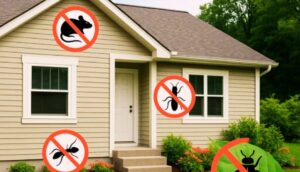How to Keep Snakes Out of the Yard

When it comes to snakes, many people are apprehensive or have mixed feelings about these slithery creatures that are feared. I have had many days of running into snakes, and to be honest with you, they were not pleasant experiences.
The Eco-System
Let’s face it, there will always be snakes, as much as I hate to admit it. Snakes are an integral part of the ecosystem, contributing to it just like other animals. They play a crucial role. For example, rats are rodents that spread diseases and are a menace by invading our homes, causing destruction; however, rats are a food source for snakes. Besides the many attempts we make to eliminate rats, snakes come to the rescue by making a meal out of them. That’s all good and well, but I am still not fond of snakes.
Our Gardens and Yard
Whether we have a garden or not, there will always be snakes that will seek to pay us an unfriendly, unexpected visit because, just like other animals, snakes seek out food, shelter, and a water source for their survival. The unfortunate thing, however, is that some of them end up in our yards and gardens.
Having a garden with plants of all shapes and sizes attracts and increases the activities of these creatures. Some of these snakes are venomous and are a threat to humans and pets. The question is, how do we keep snakes out of our yards and gardens to make these areas more enjoyable?
Call in the Professionals
Note: If you have a snake issue, your first defense is calling a wildlife conservation organization or a pest control company to assist with the capture and release of snakes back into the wild. Remember, caution should be taken when attempting to handle snakes because they are poisonous and are considered wildlife.
Here are some steps to follow that will minimize the number of unexpected visits you get from these creatures.
How to get rid of snakes
- Keep your yard and garden clutter-free; piles of leaves should be raked up. Boxes, bags, cut logs, lumber, and other materials should be kept off the ground because snakes love these areas to hide and rest
- Food sources such as roaches, rats, mice, etc, are favorites of snakes. Keeping these food sources at bay will lessen the chance of snake invasion. Using traps, repellents, insect sprays, etc, can help to keep these rodents away
- Laying snake traps is an effective way to control snakes.
- If you have a lawn, keep it cut low because snakes love to hide and rest in overgrown lawns.
- Snake Away is a product that can be used to keep snakes at bay.
- Soak rags in ammonia and place them in open plastic bags. Place bags where snakes are seen; the smell will keep them away.
- Low-growing plants and shrubs that grow densely are a good hiding place for snakes. Thin shrubs and remove lower limbs of shrubs and low garden plants to control snakes in these areas.
- Using mothball flakes and cat litter sprinkled in areas where you saw snakes will cause them not to return.
- Install snake fence-proofing.
- Keep your garden and other areas weed-free.
- Unfortunately, bird feeds and baths will attract birds, which will, in turn, attract snakes. I think you get my point.
- Placing sulfur near entryways and around the perimeter of your yard will keep snakes away.
Recommended Snake Control Products
1. Snake Repellents (Granules & Sprays)
-
Ortho Snake B Gon Snake Repellent Granules – highly rated, safe around people & pets.
-
Victor Snake-A-Way Outdoor Snake Repelling Granules – EPA-registered, one of the most popular snake repellents.
2. Snake Traps
-
Catchmaster Heavy Duty Snake Glue Traps – safe, non-toxic sticky traps.
-
Harris Snake Glue Trap – durable and designed for larger snakes.
3. Snake-Proof Fencing
-
Yardgard Galvanized Hardware Cloth (Snake Fence Material) – strong mesh fencing that keeps snakes out.
-
Amagabeli Snake Fence Wire Mesh – flexible and good for gardens.
4. Outdoor Pest Control (Rodents & Insects – Snake Food Sources)
-
Tomcat Mouse & Rat Trap – effective for rodents.
-
Hot Shot Ant & Roach Killer Spray – reduces insects that attract snakes.
Plants that Repel Snakes
Because some plants and flowers that carry strong aromas are known to reduce the presence of snakes, here is what to plant.

- Rosemary
- Lemongrass
- Pepper
- Garlic
- Mint
- Ginger
- Onion
- Thyme
- Sage
- Marigold
- Cactus
- Indian snakeroot
- Wormwood
- Kaffir lime
Essential Oils to Control Snakes
Pouring or spraying essential oils in areas that may attract snakes is said to “help bring control, repelling or keeping snakes at bay”. Although these oils may repel snakes and are non-toxic to humans, they can be toxic to pets if injested, so keep these oils away from pets. Some of these oils include:

- Garlic oil
- Cinnamon oil
- Citronella oil
- Lavender oil
- Cedar oil
- Pine oil
- Clove oil
- Lemongrass oil
- Rosemary oil
- Sage oil
- Juniper berry oil
Call in the Professional
Many snakes are venomous and should be handled by those who are highly trained. If snakes are seen in your yard or garden, then call a professional to remove them. Snakes, because of being poisonous, should be handled by those who are trained. (wildlife control team).
10 Frequently Asked Questions (FAQs)
1. Why are snakes coming into my yard in the first place?
Snakes are usually searching for food, water, or shelter. If your yard has tall grass, woodpiles, rodents, or lots of moisture, it’s like an open invitation to them. Keeping things tidy can really make a difference!
2. What can I put around my yard to repel snakes naturally?
Great question! Natural repellents like vinegar, clove oil, cinnamon oil, and garlic have strong smells that snakes dislike. You can mix essential oils with water and spray around fences, sheds, and porches for a chemical-free repellent.
3. Does having a clean yard really help keep snakes away?
Absolutely. A clean, clutter-free yard removes the hiding spots snakes love. Mow your lawn regularly, trim bushes, and remove any debris or woodpiles. The less cover they have, the less likely they are to hang around.
4. Will mothballs keep snakes out of my yard?
Despite the old wives’ tale, mothballs are not a safe or effective snake repellent. In fact, they can be harmful or dangerous to pets and children. It’s best to stick with proven, non-toxic options or professional-grade snake repellents.
5. Are there any plants that help repel snakes?
Yes! Some plants are said to deter snakes thanks to their strong smell. Try adding marigolds, lemongrass, onions, or garlic to your garden. They look great, smell strong, and may help keep slithery visitors at bay.
6. What should I do if I see a snake in my yard?
Don’t panic! Some snakes are harmless and just passing through. Give it space, keep pets and kids inside, and avoid handling it. If it sticks around or you think it’s venomous, call local animal control or a snake removal expert.
7. Do snake fences really work?
Yes, snake-proof fencing can be very effective—especially if you live in an area with lots of snake activity. These fences are made with fine mesh and are buried a few inches underground so snakes can’t sneak under. Make sure the fence is angled outward for best results.
8. How can I tell if I have snakes living in my yard?
Look for subtle signs like shed snake skins, snake trails in dusty areas, or droppings that resemble bird poop with white tips. You might also notice fewer rodents or frogs—snakes’ favorite snacks.
9. Can pets like cats or dogs help keep snakes away?
Some pets might deter snakes, especially if they’re active in the yard. However, it’s risky—snakes can bite if they feel threatened. It’s better to focus on prevention methods than relying on pets to protect your yard.
10. When is snake season, and should I be more careful during that time?
Snake activity usually increases in spring and summer when they’re more active due to the warmth. Be extra cautious during these months—especially after rains or during mating season. Keep your yard maintained and stay aware of your surroundings.
Conclusion
Snakes can be a plus and a minus depending on the situation. Following these steps can go a long way in helping you to win the war against snakes. Remember, they are attracted to our environment because of food, water, and shelter. Removing or making these sources unavailable will minimize or even stop them from entering our yards and gardens.









